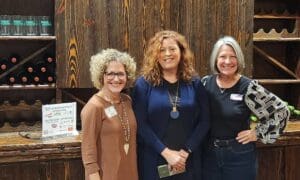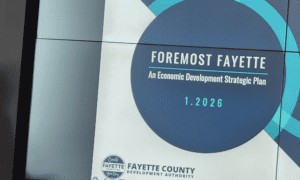It’s all boiling down to a preference of old versus new. And it looks like the future of the Kohl’s department store and the remaining 225,000 square feet of retail and three community football fields proposed for location in the northeast section of the previously approved Fischer Crossing retail development in east Coweta will be a matter of whether Coweta County commissioners side with the small, but long-established owners of the Featherston Fishing Club at Wynn’s Pond who oppose the project. The issue was discussed Thursday and will continue Sept. 21.
Commissioners Thursday night took up the issue of the proposed rezoning of a small section of the much larger retail center at Fischer Road and Ga. Highway 34 and the rerouting of the portion of Wynn’s Pond Road near Fischer Road. A conditional use request that would establish the football fields and a daycare center are also expected to be considered on Sept. 21.
As currently configured, Wynn’s Pond Road separates the previously approved retail for the immediate northeast corner of the development from the retail and ballfields immediately to the north that constitute the proposal under consideration.
The board Thursday conducted public hearings on the request by the Fischer Crossing Development Group. The request would locate an additional 225,500 square feet of commercial space for Kohl’s, T.J. Maxx and other retailers in a portion of the 35-acre site located just north of the northeast corner of Fischer Road and Hwy. 34.
Other portions of the Fischer Crossing development include the Sam’s Club and NCG Cinemas now under construction. In total, commissioners previously approved several hundred thousand square feet of retail for the expansive development that was indicated in the county’s Comprehensive Plan and Land Use Map.
The rezoning and road abandonment requests were recommended for approval last week by the county’s Board of Zoning Appeals but recommended for denial by the county Planning and Zoning Department. The recommendation for denial was based significantly on an agreement approved by commissioners in 2006 and 2007 designed to protect Wynn’s Pond Road and the adjacent historic neighborhood and the failure of the developer to obtain 100 percent agreement of the Wynn’s Pond community. Another reason for the recommendation cited concerns that Wynn’s Pond Road, if rerouted to the north, would affect future transportation funding.
The area for the proposed location of Kohl’s and other retailers was originally designated for use as a wastewater treatment area. That use changed when developer Scott Seymour bought in to the county sewer system. At that point the property reverted back to its Rural Conservation (RC) zoning. Seymour now wants to expand the retail into a portion of that area, with project representatives citing changes in retail requirements that give developers the ability to lure businesses.
The public comments portion of the three-hour meeting included numerous speakers on both sides of the issue. Featherston Fishing Club representatives clearly noted the private community’s longstanding presence on the Coweta County side of Wynn’s Pond and their desire not to have Wynn’s Pond Road rerouted. Fishing club President Theo Mann noted the organization’s century-long ownership of the Wynn’s Pond property, adding that his group had worked with commissioners in recent years to include the conditions that prohibited the rerouting of Wynn’s Pond Road.
Speaking on the conditional use request pertaining to the ballfields, board of trustees member Pat McKee said the use of that area for recreation is an illusion, adding of Seymour that, “As certain as night follows day, he’ll be back,” to request additional development to pay off creditors.
Responding later in the meeting to that assertion, project representative and Atlanta-based CBRE Vice President Kirk Buttle said the 14-acre property for the ballfields would be recorded as perpetual easement so that the land could not be used for any other purpose than recreational.
Others during the public hearing spoke in favor of the proposal. Among those were business owners, residents of neighborhoods and athletic coaches. One of those said his organization had 400 members who have been looking unsuccessfully for three years to find a place to play football.
Another speaker during public comments who later taking questions from commissioners was Kohl’s real estate broker Van Westmoreland, who told the board that Kohl’s has signed a Letter of Intent to locate at Fischer Crossing. And unlike Wynn’s Pond supporter and landscape architect Dennis Drewyer who suggested that Kohl’s could locate in the area to the south already zoned for retail, Westmoreland told commissioners that Kohl’s would not be interested in locating in that area. Westmoreland said Kohl’s had looked at that possibility but found it unfeasible.
At one point during the discussion, Commissioner Randolph Collins suggested that a significant reason for having the retail development located where it is was to benefit Peachtree City for shopping purposes. Collins did not mention the large percentage of Coweta residents living in the eastern portion of the county, many of whom live closer to Fischer Crossing than to Ashley Park in Newnan, the county’s other large retail venue.
Though mentioned at the meeting by project attorney Mark Forsling, the economic impact study by economists from the University of West Georgia received virtually no comment or questions during the meeting.
Buttle, however, in noting the adverse effects of the recession on business development around the state, did tell commissioners that there are no communities or cities with projects like the one at Fischer Crossing happening anywhere in north Georgia today.
Seymour last week released an economic impact report on the Fischer Crossing development, including the portion of the development that is the subject of the Sept. 16 public hearing. The 16-page report, entitled “The Economic Impact of Fischer Crossing Shopping Center on Coweta County” was compiled by Dr. William Smith and Dr. Hilde Patrol-Boenheim, both of the University of West Georgia’s Department of Economics.
The study divides the entire Fischer Crossing development into pod areas for purposes of gauging job creation and economic impact. Pertinent to the rezoning and road abandonment request is Pod B and Pod C. Pod B would be the location of the Kohl’s, T.J Maxx, a sporting goods store, other retail outlets and a restaurant. The southernmost portion of Pod B is situated in the property already rezoned. The northernmost portion, along with all of Pod C, is situated in the property up for review by commissioners. It is in this portion of Pod B that the Kohl’s store would serve as the anchor, along with three large retail buildings to the east. Pod C is the proposed location of the three football fields and a daycare facility.
According to the University of West Georgia report, Pod B in total would contain more than 270,000 square feet of commercial space and employ 310 people with wages totaling $6.75 million. Pod C would be the site of a 12,500 square-foot day care center along with the three football fields. The daycare facility would employ 15 people with wages totaling $206,000. The football fields would be used by community teams.
In total, the Fischer Crossing is situated in five pods. Of the remaining previously approved portions of the property, Pod A is located on the extreme eastern portion of the northeast corner of Fischer Road and Hwy. 34 and includes the NCG Cinemas now under construction, an aquatic center and other retail outlets, all totaling more than 60,000 square feet and projected to employ 100 with annual wages estimated at $1.5 million.
Pod D is situated on the northwest portion of the property and includes the Sam’s Club, also currently under construction, along with retail stores and a restaurant, all totaling 158,000 square feet and employing 233 people with wages totaling $5.2 million.
Pod E is located on the southwest corner of the development and currently has no commercial space under development. The report noted that, once developed, the pod will include retail stores, a bank and restaurant totaling 300,000 square feet and providing 320 jobs with an estimated payroll of $7.5 million.
As significant as the shopping, jobs and wages that the development is expected to bring are the tax revenues that would be collected for Coweta County. The report notes the difference in property tax revenues and sales tax revenues depending on the decision of commissioners to deny the current request and keep the development as it currently stands or whether they approve the current requests and allow for the expansion of Pod B and the creation of Pod C.
“If partially developed as specified, Coweta County property tax revenues are estimated to be $1.2 million or 3.9 percent of current property tax revenues, the majority of which will remain at the local level. County sales tax revenues are estimated to be $4 million or about 21.7 percent of current sales tax revenues,” the report said. “If fully operational, property tax revenues are estimated to be $2 million or 6.5 percent of total property taxes. Sales tax revenues are estimated to be $5.1 million or 27.7 percent of current sales tax revenues. Thus, local revenues (sales and property taxes) generated by the operational phase is estimated to be between $5.2 and $7.1 million annually, or between 8.7 and 11.9 percent of total county revenues.”
While not part of the report, there is yet another factor that figures into the sales tax equation. It is one that comes with the business reality that, when it comes to shopping, dining and entertainment preferences and convenience, county lines have long since evaporated. In that regard, it is undeniable that the Fischer Crossing development is likely to draw significant numbers of Fayette County’s estimated 107,000 residents, including those living in Peachtree City less than a mile away.
Meantime in other areas of the Fischer Crossing retail development, construction on the 136,000 square-foot Sam’s Club store on the northwest corner of Fischer Road and Hwy. 34 is now well underway.
The proposed project has received a Development of Regional Impact (DRI) approval with conditions from the Three Rivers Regional Commission along with approval with conditions from the Georgia Regional Transportation Authority (GRTA).
Commissioners will continue the public hearings Sept. 21 and are expected to make a decision.











Leave a Comment
You must be logged in to post a comment.